#solidarity to the wga writers!
Text
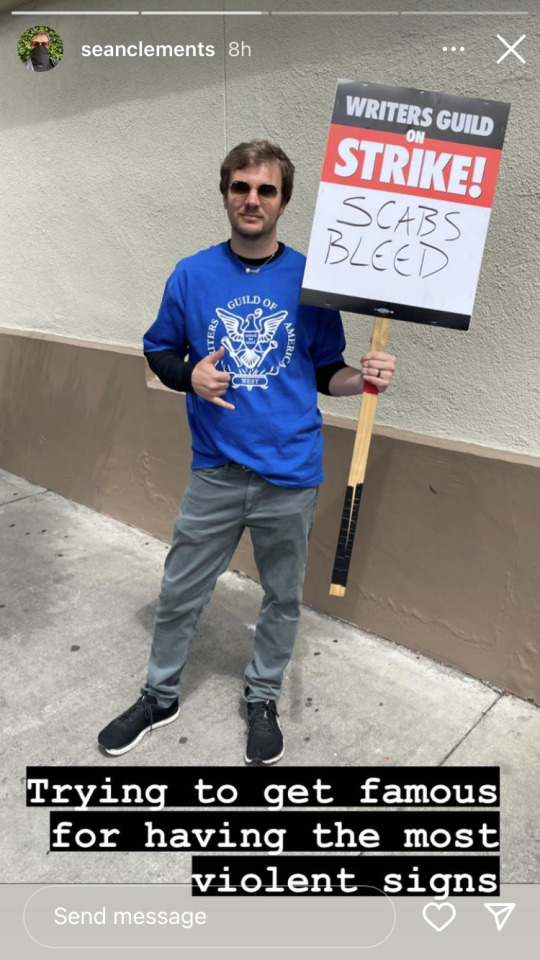
7 notes
·
View notes
Text
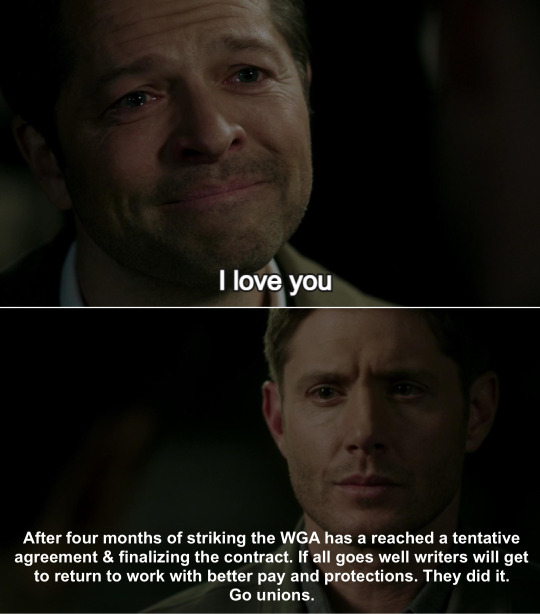
I’m so happy for them
[Image Description: Castiel from Supernatural is saying I love you, underneath is an image of Dean Winchester with the caption: “After four months of striking the WGA has a reached a tentative agreement & finalizing the contract. If all goes well writers will get to return to work with better pay and protections. They did it. Go unions”]
(Source)
#wga solidarity#wga strong#after months of watching union busting and anti union tactics#wga is coming out strong#hopefully sag is next!#writers strike#support unions#wga strike#sag strike#supernatural meme#destiel#destiel meme#workers rights#fuck the amptp#destiel news#mine#we’ve hit the note amount where people start fighting in the notes#stop fighting kids#but also the strike was absolutely necessary#withholding labor is how unions negotiate for better rights#the CEOs are multimillionaires who refused to pay proper wages#they needed to receive heavy losses so they’d actually come to the table listen to union demands
74K notes
·
View notes
Text
Possibly the greatest NPR exchange ever recorded
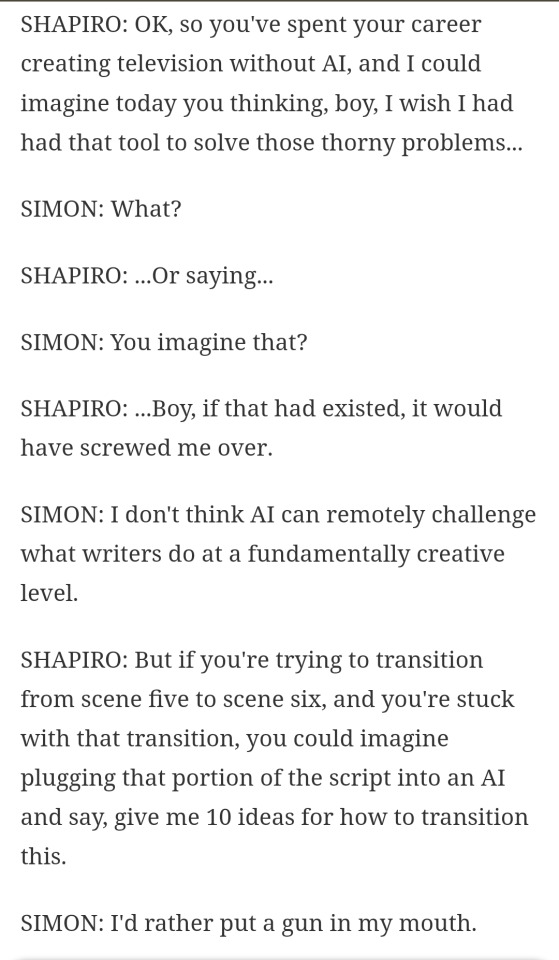
#npr news#ai#support the wga#wga strike#writers strike#anti ai writing#david simon#wga solidarity#he said that#the wire#ari shapiro
69K notes
·
View notes
Text
I think we should let Ron Perlman burn a house down. You know, as a treat.
Thanks @ingdamnit for bringing this to my attention.
31K notes
·
View notes
Text
I love this so much
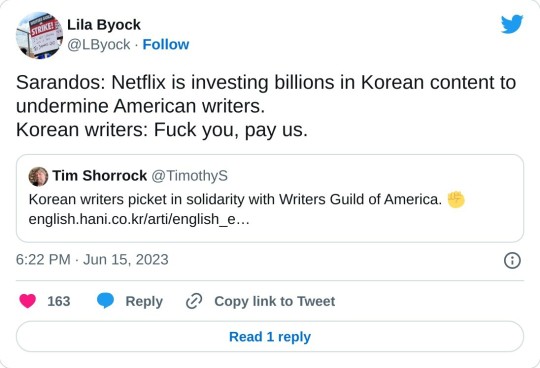

[Image IDs: the first tweet is from Lila Byock (@/Lbyock) from June 15th, 2023 and it reads:
Sarandos: Netflix is investing billions in Korean content to undermine American writers.
Korean writers: Fuck you, pay us.
That first tweet quote tweets the second image, a tweet from Tim Shorrock (@/TimothyS) from June 15th, 2023 that reads:
Korean writers picket in solidarity with Writers Guild of America. ✊
That tweet has a link to an article that I posted after it. /End ID.]
So, for those of you unaware: The Korean entertainment industry is an absolute nightmare. Actors have gone years never being paid for work they're owed pay on. The idol industry is terrible in all the ways. And it's honestly no surprise the industry is shit for writers as well. Glad to see the Korean writers are standing up for themselves too!
Edit: Not that anyone will see this because the post is too big now, but many writer organizations in countries around the world also participated in striking on June 14th, 2023.
40K notes
·
View notes
Text
26 September: thread by WGA member David Slack
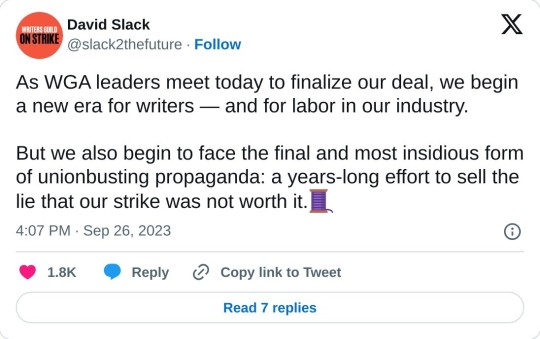
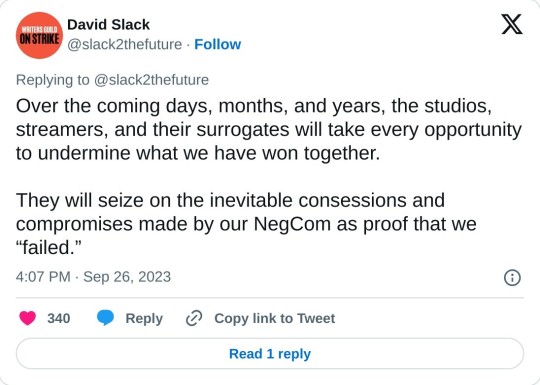
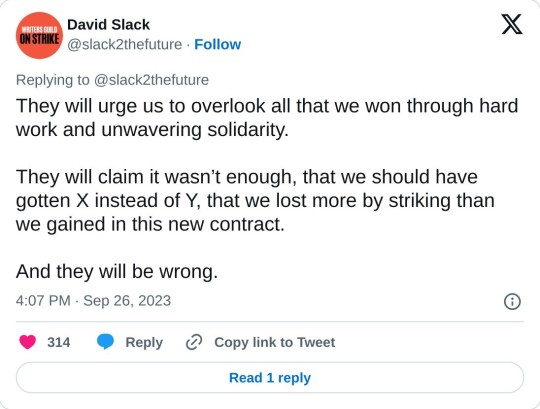
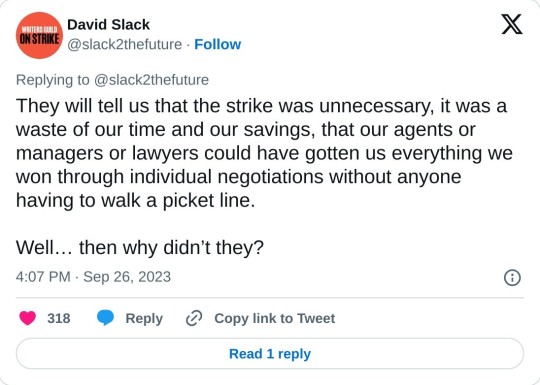
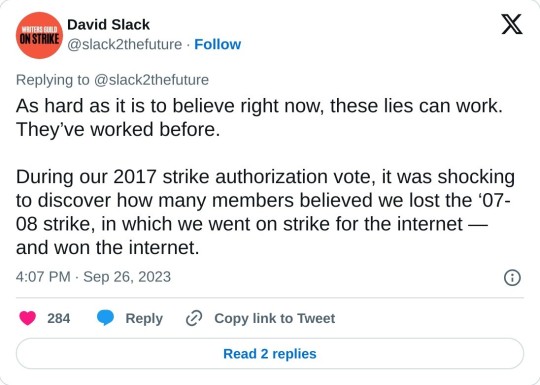
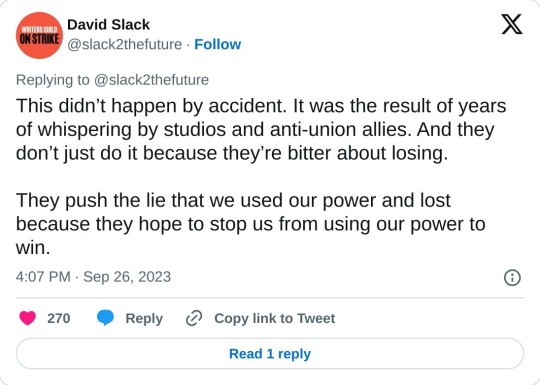
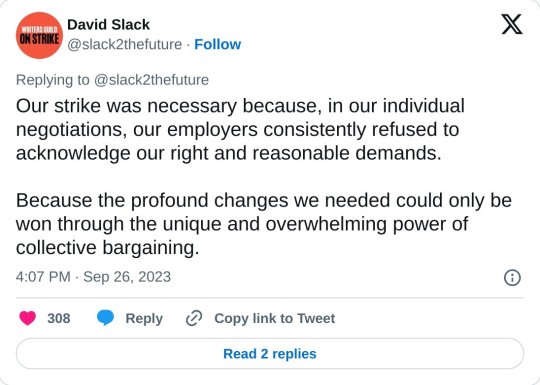
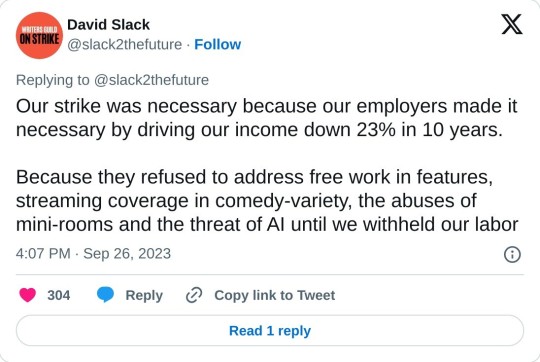
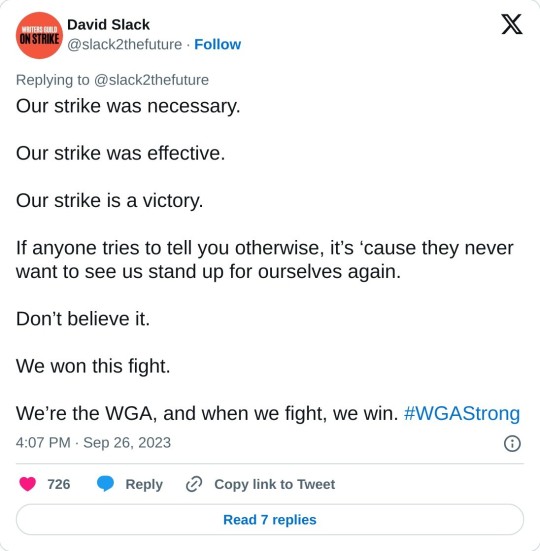
Twitter thread by David Slack @/slack2thefuture:
"As WGA leaders meet today to finalize our deal, we begin a new era for writers — and for labor in our industry. But we also begin to face the final and most insidious form of unionbusting propaganda: a years-long effort to sell the lie that our strike was not worth it.
Over the coming days, months, and years, the studios, streamers, and their surrogates will take every opportunity to undermine what we have won together. They will seize on the inevitable consessions and compromises made by our NegCom as proof that we “failed.”
They will urge us to overlook all that we won through hard work and unwavering solidarity. They will claim it wasn’t enough, that we should have gotten X instead of Y, that we lost more by striking than we gained in this new contract. And they will be wrong.
They will tell us that the strike was unnecessary, it was a waste of our time and our savings, that our agents or managers or lawyers could have gotten us everything we won through individual negotiations without anyone having to walk a picket line. Well… then why didn’t they?
As hard as it is to believe right now, these lies can work. They’ve worked before. During our 2017 strike authorization vote, it was shocking to discover how many members believed we lost the ‘07-08 strike, in which we went on strike for the internet — and won the internet.
This didn’t happen by accident. It was the result of years of whispering by studios and anti-union allies. And they don’t just do it because they’re bitter about losing. They push the lie that we used our power and lost because they hope to stop us from using our power to win.
Our strike was necessary because, in our individual negotiations, our employers consistently refused to acknowledge our right and reasonable demands. Because the profound changes we needed could only be won through the unique and overwhelming power of collective bargaining.
Our strike was necessary because our employers made it necessary by driving our income down 23% in 10 years. Because they refused to address free work in features, streaming coverage in comedy-variety, the abuses of mini-rooms and the threat of AI until we withheld our labor
Our strike was necessary. Our strike was effective. Our strike is a victory. If anyone tries to tell you otherwise, it’s ‘cause they never want to see us stand up for ourselves again. Don’t believe it. We won this fight. We’re the WGA, and when we fight, we win. #WGAStrong"
#wga strike#writers strike#union solidarity#i stand with the wga#sag-aftra strike#actors strike#wga strong#current events#david slack#long post#fans4wga
10K notes
·
View notes
Text
writer's strike is amazing actually go girl get that fucking marvel show UNMADE get that fucking gay pirate show CANCELLED get these chronically online fandom bitches' obsessions on HOLD until the corporations learn to pay you your mf money that you deserve
20K notes
·
View notes
Text

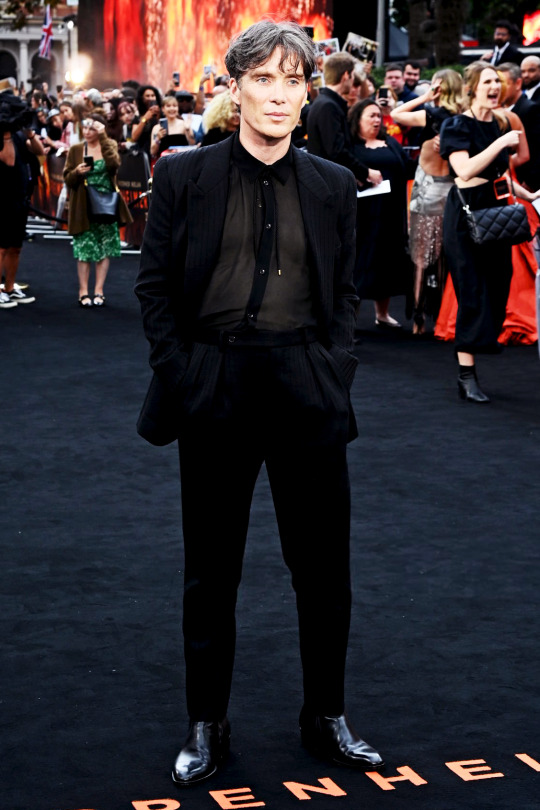
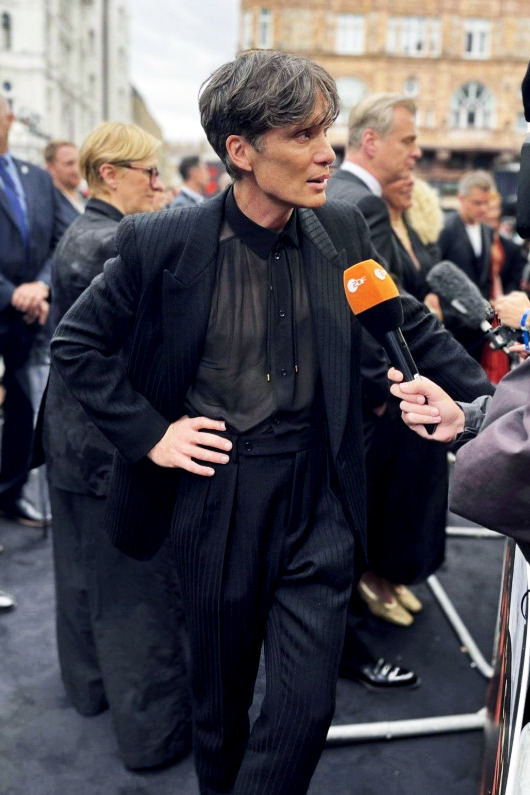


he came. he slayed in this little see-through black number. and then he walked out of his own premiere with the rest of the cast in support of the strike... cunty af
#i love a grey-haired 40-something twink who looks like a lesbian#cillian murphy#oppenheimer#wga strike#screen actors guild#writer’s guild of america#writers strike#sag strike#sag-aftra#wga solidarity#christopher nolan
11K notes
·
View notes
Text
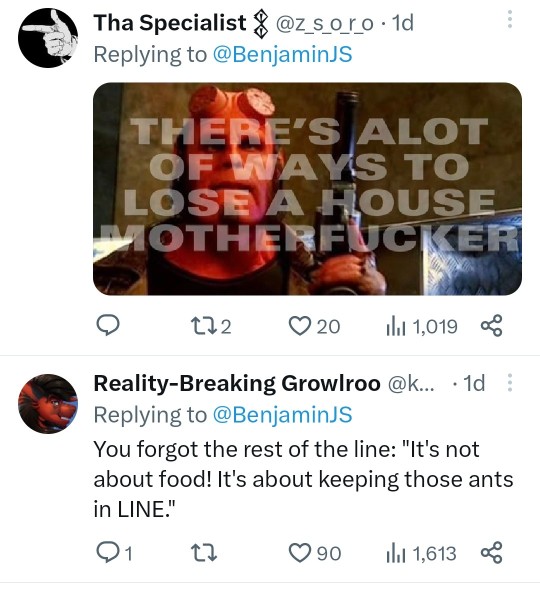


11K notes
·
View notes
Text

Reblog or repost
13K notes
·
View notes
Text
The news of the WGA deal is wonderful! However I just want to make a note of the news articles that will report on this:
It will be subtle, and you may not even notice it, but the language used in many articles will imply that SAG-AFTRA is still to blame for hollywood being shut down.
REMEMBER, THE ACTORS STRIKE IS STILL 100% THE FAULT OF THE STUDIOS AND THE AMPTP.
#wga#sag aftra#wga strike#sag aftra strike#union solidarity#stand with sag aftra#writers strike#actors strike
7K notes
·
View notes
Text
The way he SLAYYEDD
Ai could never give us “we put the greed in ingredients”
#netflix#wga strike#wga#writers guild strike#writers guild of america#wga solidarity#i stand with the wga#support the wga
7K notes
·
View notes
Text
the wga + sag-aftra co-strike means an indefinite pause on the endless onslaught of superhero media
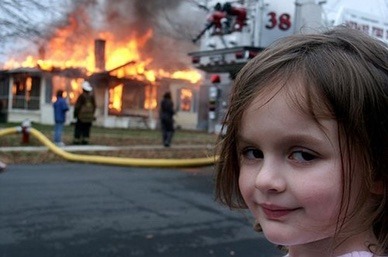
#marvel#dc universe#wga strike#sag strike#writers strike#dceu#spiderman#wga solidarity#actors strike#superman#sag aftra#screen actors guild#support the wga#support the strikes#writers guild of america#captain america
5K notes
·
View notes
Text

Who said I wasn't stubborn?
#WGA Strike#Writers Strike#WGA#WGA Strong#SAG AFTRA#SAG AFTRA Strike#SAG-AFTRA Strong#Union Strong#Justice for Creatives#Fans in Solidarity#pay your actors#pay your writers#Good Omens#Good Omens 2#Renew Good Omens
4K notes
·
View notes
Text
"The studios thought they could handle a strike. They might end up sparking a revolution"
by Mary McNamara
"If you want to start a revolution, tell your workers you’d rather see them lose their homes than offer them fair wages. Then lecture them about how their “unrealistic” demands are “disruptive” to the industry, not to mention disturbing your revels at Versailles, er, Sun Valley.
Honestly, watching the studios turn one strike into two makes you wonder whether any of their executives have ever seen a movie or watched a television show. Scenes of rich overlords sipping Champagne and acting irritated while the crowd howls for bread rarely end well for the Champagne sippers.
This spring, it sometimes seemed like the Hollywood studios represented by the Alliance of Motion Picture and Television Producers were actively itching for a writers’ strike. Speculations about why, exactly, ran the gamut: Perhaps it would save a little money in the short run and show the Writers Guild of America (perceived as cocky after its recent ability to force agents out of the packaging business) who’s boss.
More obviously, it might secure the least costly compromise on issues like residuals payments and transparency about viewership.
But the 20,000 members of the WGA are not the only people who, having had their lives and livelihoods upended by the streaming model, want fair pay and assurances about the use of artificial intelligence, among other sticking points. The 160,000 members of the Screen Actors Guild-American Federation of Television and Radio Artists share many of the writers’ concerns. And recent unforced errors by studio executives, named and anonymous, have suddenly transformed a fight the studios were spoiling for into a public relations war they cannot win.
Even as SAG-AFTRA representatives were seeing a majority of their demands rejected despite a nearly unanimous strike vote, a Deadline story quoted unnamed executives detailing a strategy to bleed striking writers until they come crawling back.
Days later, when an actors’ strike seemed imminent, Disney Chief Executive Bob Iger took time away from the Sun Valley Conference in Idaho not to offer compromise but to lecture. He told CNBC’s David Faber that the unions’ refusal to help out the studios by taking a lesser deal is “very disturbing to me.”
“There’s a level of expectation that they have that is just not realistic,” Iger said. “And they are adding to the set of the challenges that this business is already facing that is, quite frankly, very disruptive.”
If Iger thought his attempt to exec-splain the situation would make actors think twice about walking out, he was very much mistaken. Instead, he handed SAG-AFTRA President Fran Drescher the perfect opportunity for the kind of speech usually shouted atop the barricades.
“We are the victims here,” she said Thursday, marking the start of the actors’ strike. “We are being victimized by a very greedy entity. I am shocked by the way the people that we have been in business with are treating us. I cannot believe it, quite frankly: How far apart we are on so many things. How they plead poverty, that they’re losing money left and right, when giving hundreds of millions of dollars to their CEOs. It is disgusting. Shame on them. They stand on the wrong side of history at this very moment.”
Cue the cascading strings of “Les Mis,” bolstered by images of the most famous people on the planet walking out in solidarity: the cast of “Oppenheimer” leaving the film’s London premiere; the writers and cast of “The X-Files” reuniting on the picket line.
A few days later, Barry Diller, chairman and senior executive of IAC and Expedia Group and a former Hollywood studio chief, suggested that studio executives and top-earning actors take a 25% pay cut to bring a quick end to the strikes and help prevent “the collapse of the entire industry.”
When Diller is telling executives to take a pay cut to avoid destroying their industry, it is no longer a strike, or even two strikes. It is a last-ditch attempt to prevent le déluge.
Yes, during the 2007-08 writers’ strike, picketers yelled noncomplimentary things at executives as they entered their respective lots. (“What you earnin’, Chernin?” was popular at Fox, where Peter Chernin was chairman and chief executive.) But that was before social media made everything more immediate, incendiary and personal. (Even if they have never seen a movie or TV show, one would think that people heading up media companies would understand how media actually work.)
Even at the most heated moments of the last writers’ strike, executives like Chernin and Iger were seen as people who could be reasoned with — in part because most of the executives were running studios, not conglomerations, but mostly because the pay gap between executives and workers, in Hollywood and across the country, had not yet widened to the reprehensible chasm it has since.
Now, the massive eight- and nine-figure salaries of studio heads alongside photos of pitiably small residual checks are paraded across legacy and social media like historical illustrations of monarchs growing fat as their people starve. Proof that, no matter how loudly the studios claim otherwise, there is plenty of money to go around.
Topping that list is Warner Bros. Discovery Chief Executive Davd Zaslav. Having re-named HBO Max just Max and made cuts to the beloved Turner Classic Movies, among other unpopular moves, Zaslav has become a symbol of the cold-hearted, highly compensated executive that the writers and actors are railing against.
The ferocious criticism of individual executives’ salaries has placed Hollywood’s labor conflict at the center of the conversation about growing wealth disparities in the U.S., which stokes, if not causes, much of this country’s political divisions. It also strengthens the solidarity among the WGA and SAG-AFTRA and with other groups, from hotel workers to UPS employees, in the midst of disputes during what’s been called a “hot labor summer.”
Unfortunately, the heightened antagonism between studio executives and union members also appears to leave little room for the kind of one-on-one negotiation that helped end the 2007-08 writers’ strike. Iger’s provocative statement, and the backlash it provoked, would seem to eliminate him as a potential elder statesman who could work with both sides to help broker a deal.
Absent Diller and his “cut your damn salaries” plan, there are few Hollywood figures with the kind of experience, reputation and relationships to fill the vacuum.
At this point, the only real solution has been offered by actor Mark Ruffalo, who recently suggested that workers seize the means of production by getting back into the indie business, which is difficult to imagine and not much help for those working in television.
It’s the AMPTP that needs to heed Iger’s admonishment. At a time when the entertainment industry is going through so much disruption, two strikes is the last thing anyone needs, especially when the solution is so simple. If the studios don’t want a full-blown revolution on their hands, they’d be smart to give members of the WGA and SAG-AFTRA contracts they can live with."
#sag-aftra strike#sag strike#fans4wga#writers guild strike#actors guild strike#union solidarity#wga strong#i stand with the wga#wga strike#writers strike
7K notes
·
View notes
Text
2023 really feels like a big step up from the previous years, like yes the world is still burning but now it feels more like capitalism starting to burn instead of just innocent people
elon musks collosal fuckups and social decline
billionaires dying in an iron box built of hubris
the writer and actor strikes bringing hollywood to a standstill
I feel like there’s more I‘m forgetting, but I can’t help but feel a little optimistic y‘all
5K notes
·
View notes